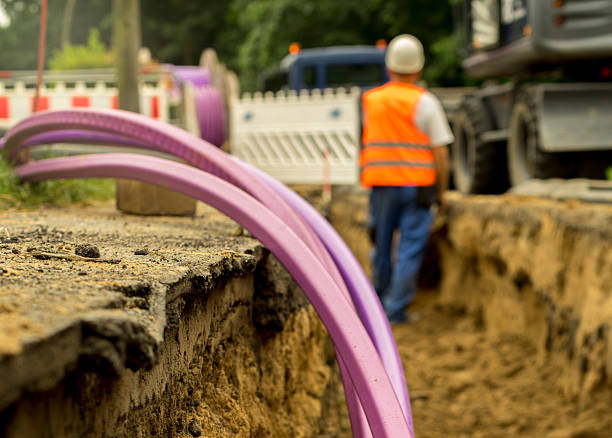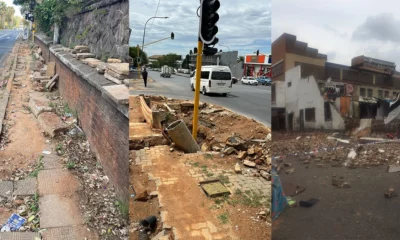News
Fear and Fibre: How South Africa’s Construction Mafia Is Holding Internet Dreams Hostage

Fibre providers are under siege, and South Africa’s hopes for widespread, affordable internet are being trampled by guns, greed, and gangster-style tactics.
In South Africa, a quiet war is raging—not over land, politics or oil, but over fibre optic cable. The country’s internet future is being choked by a deeply rooted problem that’s far more dangerous than petty theft. It’s called the construction mafia. And they’re not just threatening infrastructure, they’re threatening lives.
Not Just Vandalism A Hostile Takeover
It might sound like a petty crime at first: someone cuts through fibre lines, and suddenly, a whole township is offline. But dig a little deeper, and the story turns darker.
Paul Colmer of the Wireless Access Providers Association (WAPA) believes these aren’t random acts of theft. In fact, the fibre cables themselves are worthless on the black market. “You can’t sell it,” Colmer told CapeTalk. “There’s no resale value.” Rumours swirl that fibre strands are being crushed into drug cocktails or stripped for Kevlar to make makeshift bulletproof doors. But even those tales don’t explain the scale and focus of the attacks.
According to Colmer, the real motive is strategic sabotage. Business forums locally known as “construction mafias”—are reportedly behind the destruction. The game? Break the network, then force fibre companies to give them contracts to fix it.
The Old Copper Tricks Are Back
This isn’t the first time South Africa has seen this trick. Back in the days of copper lines, it was the same cycle: destroy, then demand to be hired to replace. Today’s fibre rollout just offers a shinier, more profitable target.
The forums, operating under the guise of community upliftment, demand that internet providers subcontract work to their members often using threats or violence to get their way. Colmer notes that in many communities, fibre network operators (FNOs) are caught between the barrel of a gun and a contractual agreement they never wanted.
Inside the Fibre War Zone
Mark O’Donoghue, former sales head at Link Africa, didn’t mince words during a panel at ZANOG@iWeek 2024. “We’re spending R1 million a month on security,” he said. The company has faced it all AK-47s at their offices, hostage situations in boardrooms, and forced handovers of rollout maps to gang leaders.
One of the most jarring details? FNOs can’t even move between neighbourhoods without consulting multiple rival gangs. “A 5km cable run might mean dealing with three separate business forums,” said O’Donoghue. “You have to hand over your team like a baton at each border.”
Miss a handoff—or refuse to play the game—and your staff might have a gun to their head, your trucks could vanish, and no one from the local police will lift a finger.
Where Are the Authorities?
The reaction from law enforcement? Practically nonexistent.
O’Donoghue says reporting these crimes to police is “not even worth the time.” The criminal networks seem to operate with impunity, leaving private companies to fend for themselves. Some FNOs have even had to recruit respected elders from local communities to act as mediators and peacekeepers.
It’s a chilling reflection of how deeply embedded these mafias are in certain regions and how the state seems to have relinquished control.
South Africa’s Digital Future at Risk
All of this comes at a time when South Africa desperately needs to expand broadband access. The government’s own goals include connecting rural communities and bridging the digital divide. But the very networks that could help children learn, entrepreneurs thrive, and rural clinics function are being held hostage.
Every fibre line cut and every engineer threatened pushes this dream further out of reach.
Fighting for the Right to Connect
South Africa is not short on skilled workers or fibre investment. What it’s short on is protection—legal, institutional, and physical. It’s unacceptable that private companies must operate like military units to roll out basic infrastructure.
We talk a lot about smart cities, AI, and a digital economy. But without the backbone literally, the fibre we’re stuck in neutral.
The fibre war isn’t just about business. It’s about who gets to access opportunity, who gets left behind, and who controls the future of connectivity.
Until the state steps up, the construction mafia will keep cashing in and South Africans will continue paying the price, offline and in the dark.
{Source: My Broad Band}
Follow Joburg ETC on Facebook, Twitter , TikTok and Instagram
For more News in Johannesburg, visit joburgetc.com



























